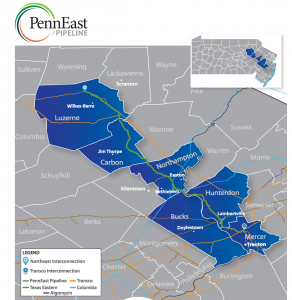Pipeline opponents target Drexel University
-
Susan Phillips
Academics are now getting caught up in mounting opposition to Pennsylvania’s pipeline building boom. Twenty local anti-fracking and pipeline opposition groups have signed off on a letter calling on Drexel University to distance itself from an economic analysis of the PennEast pipeline published by the Philadelphia-based Econsult and Drexel University’s LeBow College of Business. The groups say the study is more of a marketing ploy than an objective academic treatise.
Their letter is addressed to Drexel University president John Fry:
“This analysis provides a distorted economic analysis of the PennEast Pipeline project that demeans your institution and damages your credibility as an academic institution interested in providing good quality training and education to students seeking to secure a high quality and credible economic education.”
A consortium of companies behind the proposed PennEast pipeline commissioned the study, which found the project would generate $1.62 billion for the Pennsylvania and New Jersey economies during the construction phase. It also projects design and construction of the pipeline would support 12,160 jobs and pay about $740 million in wages. Econsult released a similar analysis several weeks ago, projecting $4.2 billion in economic benefits for Pennsylvania from the Mariner East pipeline project.
“PennEast is clearly an important player in an important chapter in a broader energy story taking place in the region,” said Drexel economics professor Vibhas Madan, one of the co-authors of the study, at the time of its release.
A glut of natural gas production has led to a boom in new pipeline construction to move that gas to market. The 114-mile, 36-inch pipeline would deliver 1 billion cubic feet of natural gas a day and has met with strong opposition in the 6 counties in Pennsylvania and New Jersey where construction is planned.

Courtesy of PennEast Pipeline Company
The proposed route of the PennEast pipeline. Click to enlarge the image.
In an email, Drexel University spokeswoman Niki Gianakaris tells StateImpact that the study is not an endorsement of the project.
“Drexel professor Vibhas Madan and Econsult Solution’s Steve Mullin conducted a simple standard input-output analysis based on data provided by Penn East,” wrote Gianakaris. “This was neither a cost-benefit analysis of the project nor an endorsement of it. This was a straight analysis of employment, fiscal and potential price effects of the project.”
But the Delaware Riverkeeper Network’s Maya van Rossum, who is one of the signatories to the letter, says that contradicts the characterization of the study PennEast is delivering to those who would be impacted by the pipeline.
“That document is clearly a marketing project for PennEast so Drexel is putting its stamp of approval on the project,” said van Rossum. “PennEast says this report is a demonstration of a net benefit to the community. If the professor really thinks this is a benign analysis, and now knows that it’s not being used that way, he should get his name off of [the study] right away. It’s not simply information in and information out.”
Van Rossum, along with the other activists, also question the integrity of the report because a former CEO of UGI, one of the companies signed on to PennEast, sits on the board of Drexel’s LeBow School of Economics Corporate Governance Center. But Drexel’s Gianakaris says Lon Greenberg played no role in the report.
“There is no conflict of interest of Lon Greenberg sitting on the advisory board for the Center for Corporate Governance since the center is independent of the School of Economics,” wrote Gianakaris in an email. “Mr. Greenberg was not involved with or aware of the analysis being conducted by the School of Economics and Econsult Solutions.”
Economic studies that try to predict job creation tend to be problematic, and often contradictory. That’s because they use different assumptions when determining a “direct” job versus an “indirect” job, and if the jobs are permanent or temporary. Penn State economist Tim Kelsey says most pipeline jobs are temporary.
“Most of the jobs associated with developing the pipeline will be relatively short-run and many of the workers, if not most of the workers involved will not be local residents,” said Kelsey. “So it’s not a local employment boost for the community.”
Kelsey says those who benefit most from pipelines in the long run are customers who want cheaper gas and electricity, especially large consumers like factories and power plants.
The Drexel study says once built, the operation of the PennEast pipeline would support 98 jobs, including about 88 in Pennsylvania and 10 in New Jersey. Backers say the project, which awaits approval from numerous state and federal agencies, would come online in 2017. Click here to read the full report on the PennEast website.

















